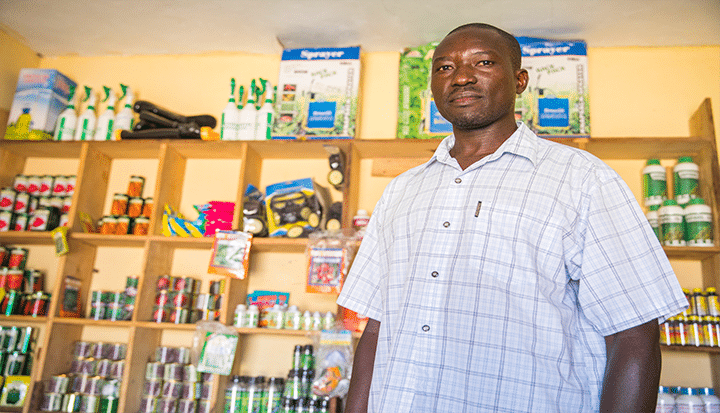For four years, Uganda’s neighbour, South Sudan, has been at war with itself. This has resulted in two million people having had to flee their country, including one million to Uganda. 80 per cent of these are women and children. They are families who have lost loved ones, their homes, their land and their livelihoods, and are now slowly trying to recover and rebuild their lives.
These South Sudanese refugees are expected to be displaced for many years. In fact, global trends suggest that once displaced for six months, refugees have a high probability of being displaced for an average of 17 years. Given the scale of the crisis and how long it’s expected to last, Mercy Corps is working to help families who have been uprooted rebuild their livelihoods so they can support themselves. Together with our partners, we’re helping Ugandans and South Sudanese re-engage in agriculture by promoting land sharing with host communities, offering subsidies for seed purchases from local agro-dealers, improving agro-dealers’ ability to access quality inputs from national seed companies, and gradually working with produce trading companies to attract them to the area.
All of this is happening in a context that shows signs of early business growth. As of October 2017, one large market in the refugee settlement of Palorinya housed 218 businesses, estimated to be more than double what it was six month earlier. What we’re seeing in West Nile is that strengthening local markets and supporting refugees to earn an income from them, are some of the best ways to help refugees recover. Yet, building these opportunities will take time and requires a combination investments including direct refugee assistance and supporting market growth.
Based on Mercy Corps’ recent programming and research in Uganda, here are five things we have learned about using local markets to support refugees rebuild:
- In-kind aid is not a sustainable solution to the refugee crisis, and can slow down economic growth and undercut existing market players: Despite moves by a few organisations to switch from handing out food or goods to supporting refugee families with cash aid, in 2017 the majority of aid in the West Nile was still given as in-kind food assistance. Our research has shown that in some cases these food handouts undermined the local economy, by undermining local supply chains and reducing demand for crops grown locally by farmers. We also found that the market for certain food items became flooded, as refugees in desperate need of money sold off any food donations they could spare.
- In the short term, cash assistance is an effective way to support refugees and strengthen local markets: Giving cash aid to vulnerable families enables them to make their own decisions about what they most urgently need. Cash has also been a significant driver of short run spending by refugees who otherwise lack financial resources. Speaking about the difference this assistance has made to her family, a South Sudanese grandmother called Tabu said that the emergency payment, “helped us survive”. As well as being a lifeline for families in desperate need, cash spent in local markets can open up new business prospects in West Nile. Before refugees arrived in the area, most locals relied on subsistence farming and few sold their produce in markets. But since refugees arrived, local Ugandans have started growing more produce for market, and trade networks have seen a growth in revenue for agriculture products that aren’t included in food distributions.
- In the longer term, refugees need support to find work and start businesses: Tabu used some of the 38,000 Ugandan shillings (£7.50) she received from Mercy Corps each month for half a year to set up her own small market stall selling dried fish, onions and coffee to other people in Bidi Bidi refugee settlement. Tabu now earns on average 80,000 Ugandan shillings (£16) from her stall each month, double the monthly cash payment. As more refugees set up businesses, it will become increasingly important that they have diverse ways to earn an income, so that local markets don’t become overcrowded with commonly traded goods like tomatoes and silverfish. Agriculture alone will not support refugees, we must develop ways of stimulating other forms of employment and economic growth in West Nile.
- We should support the businesses that refugees and host communities rely on for their livelihoods: One agro-dealer called Pascal admitted to Mercy Corps that at first he was unsure how selling to refugees would help his business, “when Mercy Corps told me to go and sell seeds to the refugees, my first perception was – how can refugees buy?” But Pascal, whose business grew by 25 per cent in just six months last year, is now sold on the benefits. Pascal says he is now “looking at having more outlets, to be near where the refugees are,” and has since opened a small store in a refugee settlement.
- Donors need to reduce funding siloes and increase project timeframes so aid organisations can respond to changing markets: Improved coordination and funding that sits across humanitarian and development programmes can result in projects that address the integrated, yet complex needs of displaced people. For refugees facing many years of displacement, longer project timeframes are vital so that learnings are incorporated that allow projects to iterate and improve.
The refugee response in West Nile represents an opportunity to combine humanitarian and market systems development expertise in a refugee context. Bridging the spectrum from coping to recovery takes time and requires a broader commitment from all donors, and adaptation in response to continual, quality market analysis. This can have implications for future refugee responses in Uganda, but also global implications for improving refugee responses in contexts primed for market development.
Photo courtesy of Pascal Dralobu, 42, an agro dealer in Moyo, Uganda (c) Ezra Millstein for Mercy Corps










